- Home
- Gregory Maguire
Son of a Witch Page 8
Son of a Witch Read online
Page 8
“That’s what they used to say at the mauntery,” said Liir. “If a maunt dies and goes to the Afterlife, another maunt comes to take her place. Like replacing a pane of glass. It’s the work that’s important, not the individual who does it.”
“Well, I’m keeping my own counsel about my plans,” said the Scarecrow, “and I’m not long for the Emerald City, I’ll tell you that much. One day you’re a celebrity, the next day you’re hauled off to jail.”
They contemplated this as they came upon a weir. From here, a system of locks stepped the water level down steeply until it disappeared into a fortified grate. Above, armed members of the Emerald City Guard were having a smoke around a brazier. “Better not get their attention,” said the Scarecrow.
“What’s over there, that the canal is guarded?” whispered Liir as they regarded their situation.
“Not sure. Couldn’t say. But it might be Southstairs.”
“Southstairs? What’s that?”
The Scarecrow made a face in the gloom. “The high-security prison for the heartland. Don’t you know anything? I’ve only been here a week and I know that.”
“Why would they be guarding the canal grate?”
“Who knows? Maybe they’re afraid there’ll be a move to liberate Southstairs. I’m told a lot of professional Animals ended up there over the decades, cheek by jowl with murderers, pedophiles. Rapists. Political pamphleteers.”
“The Wizard’s gone. Why aren’t they just throwing the gates open?”
“You want the murderers and rapists back in the neighborhood?”
“Well—no. No, but for the dissenters.”
The Scarecrow frowned. “Dream on. Who’s going to take it upon themselves to decide which is which at this point? The job of personal fiscal betterment is far more urgent.”
“Hard to argue with that. And I bet the suppressed Animals agree with you. Are they on the move, do you know? Or hanging low until they see what develops?”
“Look, I got you safely away from Dirt Boulevard before you were swept up in a purge. I’m not going to deliver you to Southstairs so you can check on the Animals there. Let’s turn about.”
The Scarecrow piloted the blunt-boat backward until there was room enough to swing it around. Their route took them back under the balustrades where the fancy-dress ball was in progress. The laughter was more unguarded, even strident, the music brassier. “Lots to celebrate these days, for those of the right station,” said the Scarecrow. “Good news indeed. Could be another Victory Gala.”
“Celebrating the Wizard’s departure?”
“Celebrating the Witch’s death,” said the Scarecrow. His face was impassive. “Oh, sweet Oz, it’s Glinda’s house!” He tucked his head down. “Liir!”
“She doesn’t know me,” said Liir. He scrambled backward along the boat to its squared-off stern, a small elevated platform for the loading of goods. Craning, he could see a woman leaning her hips against the carved stone balustrades of the balcony. The light from the ballroom fell on her golden hair, which was swept up on her head in a bubbly mass of curls hooped by a diamond tiara. He couldn’t see how old she was, nor her expression, for her face was turned away. She was trim and fit, though her shoulders were slumped—grief, or despair? Or boredom? She dabbed a handkerchief at her nose.
Liir didn’t speak, he didn’t call out—what did he care for Lady Glinda Chuffrey? Auntie Witch had mentioned her only in passing. Sometimes with grudging respect, more often with disapproval. As he watched her, something echoed along the waters of the canal, a sound—as if a private, smoky slide of music accompanied their blunt-boat, counterpoint to the party pandemonium.
Lady Glinda turned, and gripped the rail with both hands, and leaned over as their vessel was slipping beneath a pedestrian bridge. “Shit!” hissed the Scarecrow, and stayed the boat in the shadows by throwing his weight against the pole. “She’s seen us!”
“Who is it?” called Glinda. “Who’s there?—I almost thought—”
Liir wanted to speak up. The Scarecrow clapped a gloved hand against his mouth tightly. Liir struggled, elbowed the Scarecrow, but he wasn’t strong enough to break free before Glinda shook her head as if in disbelief, straightened the epaulets on her ball gown, and returned to her affair.
“What’s the matter with you?” railed Liir, when the Scarecrow had let him go.
“What’s the matter with you?” said the Scarecrow. “I’m trying to keep a low profile in order to help you, and you have to go and signal the heads of state and alert them about it?”
“I didn’t signal her!”
“Well, she must have a sixth sense then, for she turned, and she saw you.”
“She doesn’t know who I am. She doesn’t know I exist!”
“And let’s keep it that way.”
2
THE ANIMOSITY THAT OBTAINED between Sisters Doctor and Apothecaire subsided once dusk fell on their first evening away from the Mauntery of Saint Glinda. The women erected the frame of thin skark ribs and fixed the waterproof awning to it. Then they huddled together under a blanket. When the wolves of the oakhair forest howled their midnight requiem, the Sisters mangled their devotions into such a gabble of syllables and sobs that, had the Unnamed God been condescending to listen, it could only have concluded that its two emissaries were afflicted with sudden-onset glossolalia.
“The Superior Maunt thought it safe to send us out on an exploratory mission even though the faces of those three young missionaries had so recently been scraped,” said Sister Apothecaire the following morning, which dawned damp and windless. “I trust her in every particular,” she added fiercely, unconvincingly.
“Our charge is clear,” said Sister Doctor, “safety or no. We are to make an effort to address the tribal Scrow, if we can locate them, and certainly the Yunamata. We must enquire about the disaster that struck those missionaries. With the conviction of our faith in the Unnamed God, no harm will befall us.”
“Do you propose the missionaries were in greater danger because their faith was weak?” asked Sister Apothecaire.
Sister Doctor’s lips became thinner as she folded the awning away. “Cowardice, said the Superior Maunt, will not serve us in this task.”
Sister Apothecaire relented. “Cowardice is a dubious attribute. Yet I possess it in spades, so I hope on this venture to learn how to use it to my advantage if I must. All gifts come from the Unnamed God, including cowardice, and self-repugnance.”
The mules dropped their heavy hoofs on the path, picking a way between ranks of thin trees with branches nearly empty of leaves. Little cover.
“Perhaps,” said Sister Doctor, “the Superior Maunt sent us out because we would be better able to tend to each other, medically, were we attacked.”
“If we survived. Well, I’ve no doubt that our skills here in the wilderness will prove useful. After all, I do speak a dialect of West Yumish.”
“When you’ve had a bit too much seasonal sherry.”
They laughed at that and proceeded in companionable silence until Sister Apothecaire couldn’t stand it. “Now Liir is Candle’s responsibility. Funny little thing. What can she bring to Liir that we can’t?”
“Don’t be stupid. She can bring youth and charm, if she can get his attention. She can give him a reason to survive. This is something neither you nor I could do. If he opened up his eyes after a long coma and saw either of us right off, he’d probably kick the bucket in a nonce.”
Sister Apothecaire did not murmur assent. She was rather proud of her looks. Well, her face, anyway; her figure was regrettably lumpy. “Perhaps,” she said distractingly, “Candle has a natural talent that the Superior Maunt can sense.”
“What sort of talent?” Sister Doctor shifted in her saddle and turned to peer at her colleague. “You don’t mean a talent for magic? That’s distinctly forbidden in the order.”
“Come come. You know perfectly well we resort to it when we must. Not that we’re very good at it. I need hard
ly remind you that these are dangerous times. Perhaps the Superior Maunt thinks that in the rehabilitation of the boy, such a talent is called for.”
By the straightening of her spine Sister Doctor signaled that she did not intend to second-guess the Superior Maunt’s motives. Sister Apothecaire regretted having brought it up. “Well,” she continued, falsely jolly, “I don’t have much of a sense of Candle one way or the other. If she’s got common magic or common sense, it’s news to me either way.”
“She certainly has no talent for music.” Sister Doctor sniffed. “I do remember the day she arrived, though. I happened to be suturing one of the novices in the kitchen. I turned to ask kindly for water, and there was that Candle, her rickety domingon slung over one shoulder like a crossbow. Mad old Mother Yackle had her by the hand, as if she’d just created her out of calves’ foot jelly. ‘The gypsy Quadling, her uncle leaves her to us,’ said Mother Yackle.”
“Mother Yackle doesn’t speak and hasn’t in years.”
“That’s why I remember the event so distinctly.”
“Did you see the Quadling uncle?”
“I went to the window, and he was making his way rather hurriedly through the kitchen garden. I called out to him, for there are procedures for the introduction of a novice, and this wasn’t one of them. But he wouldn’t be stopped, merely called over his shoulder that he would be back in a year if he was still alive. It’s rare to see Quadlings this far north these days. I imagine the poor girl is quite lonely.”
“Well, yes. No one speaks Quaddle.”
“I believe the term is Qua’ati. So is Candle mute or is it that she just hasn’t anyone to speak her native tongue with?”
“I don’t know.”
Perhaps it was Candle’s silence and self-control that had inspired the Superior Maunt to choose her for keeping vigil over Liir. The maunts began to regret their tendencies to bark and spark at each other. Thinking on their noisy failings, they fell into a silence now.
IN THE FOLLOWING FEW DAYS, they came across their share of blue squirrels, bald egrets, and disagreeable emmets. The egrets kept to the ground cover, rarely taking wing; the emmets preferred the bedding. It wasn’t until near dusk on the fourth day that the maunts came across an Animal, a lone and pagan Water Buffalo in the shallows of a cove of Restwater, Oz’s biggest lake.
“Oh, oh,” moaned the Water Buffalo at their approach, “not the missionary voice traveling in twos! Not again! I bury my own waste, I only speak when spoken to, I lick my knees fifty times a night before I sleep—what more am I to do to appease the fates? I don’t want to be converted! Don’t you understand? Oh, all right, get it over with. I’ll lapse before nightfall, I promise you. I can’t help myself. Perhaps I’m too far gone for you to bother with me?” He peered, both gloomily and hopefully, at them.
“We’re not converters,” said Sister Apothecaire. “We haven’t the time.”
“And who cares about you? You can go to hell,” said Sister Doctor, meaning to be cheerful. This was the right note, as it happened; the Water Buffalo began to smile.
“Scarcely see a soul coming from your direction who doesn’t have designs on my immortal soul,” said the Water Buffalo. “It used to be I was worried about my hide. I always thought a soul was private, but it appears it can be colonized against your will if you don’t watch out.”
“Well, we are maunts,” admitted Sister Apothecaire.
The Water Buffalo winced. “No. Say it ain’t so. You’re plates of glamour and glasses of fashion, as anyone who rests a sore eye upon you would have to agree.”
“Don’t be mincing,” snapped Sister Doctor. “These are perfectly respectable clothes for traveling in.”
“Depends on where you want to get to,” intoned the Water Buffalo.
“Look, we can evangelize like the best of them, if that’s what it’s going to take—”
“Sorry, sorry!” said the Water Buffalo. “I’ll be good. What’s your game?”
They told him. He knew nothing of the attacks on the young maunts and their scrapings, nor had he ever heard of Liir or his misadventure. But he had seen airborne battalions of trained creatures flying so high that he couldn’t make them out. “Something’s amiss,” he said. “I know there’s been an attempt to call a Congress of Birds out in the west, but lately I’ve seen few Birds brave enough to fly at anything like a decent height.”
“We can’t patrol the skies right now,” said Sister Doctor. “It’s the Scrow or the Yunamata we need to find.”
“The Scrow rarely venture this far east. However, you may come across a small band of Yunamata, if they haven’t moved off yet. They’re down from Kumbricia’s Pass. I came across them bathing this morning. We all minded our own business. They don’t have anything to do with the Unnamed God, so they don’t bother me, and I don’t bother them. They rinsed their totems and washed their hair, and one of them gave birth to a baby underwater. They’re rather froggy folk when it comes to birthing. They circulated a birth pipe around, passed out in the sun for an hour or so, and then gathered their things and left. They seemed to be heading southwest. Several dozen of them, no more.”
“If you see them, tell them we’re coming,” said Sister Doctor.
“Jubilation, they’ll be over the moon,” drawled the Water Buffalo. “If you want to meet up with them, better not tell them you’re coming, honeys.”
The sisters moved on, but before they had lost sight of the Water Buffalo, Sister Apothecaire thought to turn and call, “We forgot to ask your name!”
“Only the chattering classes of Animal have names!” the Water Buffalo replied cheerily. “And there hasn’t been a professional Animal the length and breadth of Oz for thirty years. If I don’t have a name, I can’t be targeted as a potential convert, can I?”
A moment later, when he was out of sight, his voice rang toward them thinly: “Though if you had to locate me, I suppose I’d answer to Buff…”
“Weird creature,” said Sister Apothecaire a while later.
“He’d survived, a talking Animal in the wild,” Sister Doctor reminded her. “It can’t have been easy. After the Wizard’s banishment, the Animals didn’t rush for reassimilation. Who could blame them, with all they’d been through.”
“Sounds as if the creature’s been dogged by zealots, though.”
“Indeed. Well, the Emperor is a devout man, and wants all his subjects to enjoy the benefits of faith, I suppose.”
ANOTHER NIGHT, and the wolves howled more fiercely than ever. The dawn seemed full of its own arcane purpose, a pale light leaching through grey cloud-hemp. The maunts ventured out across the Disappointments. Then, easy as playing at knackers, they came upon a group of Yunamata doing winter rush-work.
“Hail,” said Sister Apothecaire in Yumish, “or have I said hell by mistake? Hello? Yoo hoo Yunamata? We come in peace.”
“What are you saying?” said Sister Doctor. “They look mystified.”
“I’m addressing their tribal gods,” said Sister Apothecaire, and in Yumish, “I. Good. Good one. Good human person woman being. I. Good thing. Where is the library?” In her anxiety it was all she could remember.
“They look amused,” said Sister Doctor.
“That’s respect,” said Sister Apothecaire. But amusement was better than hostility, so she began to relax, and more of the plain tongue began to return to her.
The Yunamata were known for keeping to themselves. Nomadic, but not a horse culture like the Scrow, this Vinkus tribe was fleet of foot and economical of domestic impedimenta, needing only a few pack animals to carry their belongings. Generally they sheltered in Kumbricia’s Pass or the forested slopes of the Kells south of there. What were they doing out in open country?
Sister Doctor, who never liked to go slumming as a veterinarian, felt she could sniff out an Animal tendency: the Yunamata looked as if they might all have one giant, docile Frog among their ancestors. Way, way back. Nothing like webbing between their digits, no long flick
ering tongues, no, no; they were human through and through. But an amphibian sort of human, with leathery skin, narrow ridiculous limbs, and thin lips that seemed partly withdrawn into their mouths.
One could laugh at the silliness of them. Laugh—and then be carved to shreds, for when aroused they could be a formidable enemy. The Yunamata had skill with knives. Mostly they used their serrated tools—lethal curved blades set in handles of the hardest mahogany—for aid in the construction of their tree nests, where they harbored at night. Those same knives could carve a pig or eviscerate a minor canon with equal efficiency.
Sister Apothecaire set out to convince the Yunamata that the maunts were abroad neither to betray the clan nor to convert them. Just in case, like the Water Buffalo, they’d previously been targeted as a population ripe for conversion. As a group, they listened, promoting no spokesperson among them. By turns they mouthed small neat phrases. Sister Apothecaire took pains to translate these remarks to her colleague carefully, and to question her own understanding if she had any doubt. She didn’t want to assent to human martyrdom merely because she’d forgotten some nicety of Yumish grammar. Was there a retractional pluperfect subjunctive in Yumish?
“You are going on quite a while,” said Sister Doctor after an hour or so.
“I am doing my job and trying to see if we’re going to be invited to stay for supper,” said Sister Apothecaire. “Leave me be.”
“I hope they aren’t teetotalers. I think I’m getting a sniffle.”
When the conversation had concluded at last, and the Yunamata retreated to prepare a meal, Sister Doctor said, “Well? Well? I deduce from your smug expression that they’re not about to sharpen their blades to scrape our faces from us. Though I’d like to hear it put directly, to ease my mind.”
“They speak by indirection. They know about the scrapings. They have seen evidence of it. They say it must be the Scrow. The Scrow have a tradition of royalty, and their queen is an old woman named Nastoya who has been in declining health for a decade. Were we to fulfill the mission assigned us, we would next have to hunt for this Princess Nastoya and reprove her about these infractions. The Yunamata insist that the Scrow must be in allegiance with the Emperor.”

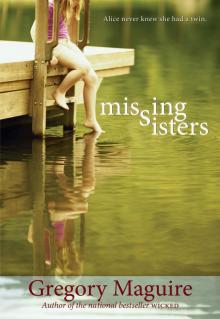 Missing Sisters
Missing Sisters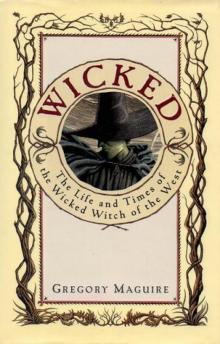 Wicked: The Life and Times of the Wicked Witch of the West
Wicked: The Life and Times of the Wicked Witch of the West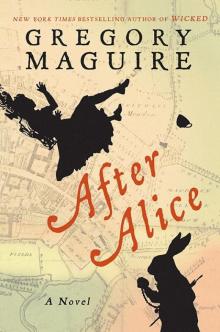 After Alice
After Alice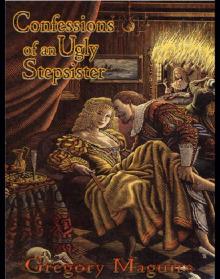 Confessions of an Ugly Stepsister
Confessions of an Ugly Stepsister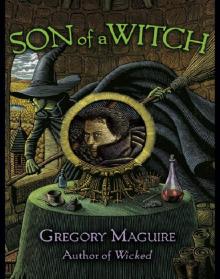 Son of a Witch
Son of a Witch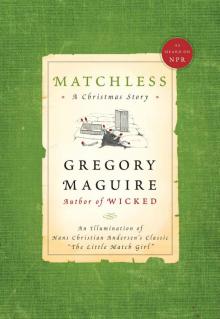 Matchless
Matchless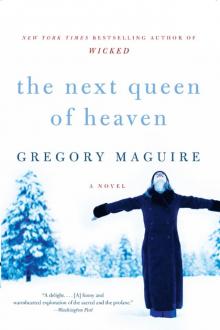 The Next Queen of Heaven
The Next Queen of Heaven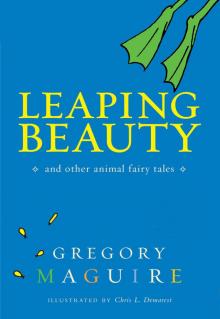 Leaping Beauty: And Other Animal Fairy Tales
Leaping Beauty: And Other Animal Fairy Tales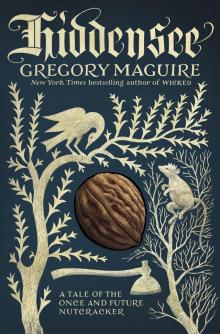 Hiddensee: A Tale of the Once and Future Nutcracker
Hiddensee: A Tale of the Once and Future Nutcracker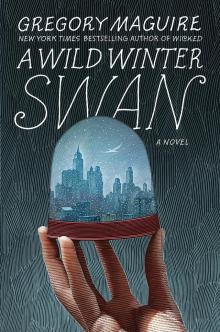 A Wild Winter Swan
A Wild Winter Swan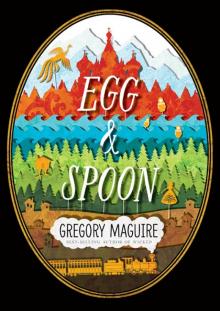 Egg & Spoon
Egg & Spoon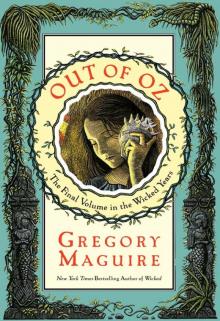 Out of Oz
Out of Oz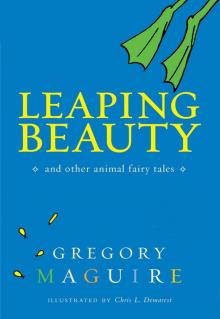 Leaping Beauty
Leaping Beauty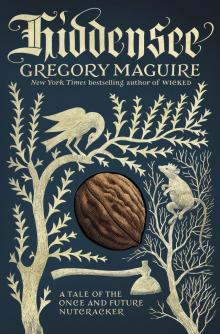 Hiddensee
Hiddensee The Wicked Years Complete Collection
The Wicked Years Complete Collection The Next Queen of Heaven: A Novel
The Next Queen of Heaven: A Novel